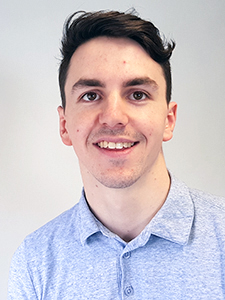Name: Ethan Drury
School: Medicine / Biology
Research area: Citizen Science and Antibiotic Discovery
Bio: I did an undergraduate degree in marine biology at Plymouth University and an MRes in Molecular Microbiology at Newcastle University. I am about to start the 3rd year of my PhD at UEA which focuses on discovering novel antibiotics produced by soil bacteria whilst engaging the public in a citizen science project. I hope to be a very (very) small part of the solution to antibiotic resistance.

Ethan's life as a UEA postgraduate research student

A day in the life
7am
I start my day by attempting to get out of bed at 7am. Half an hour later I usually manage, and then go through the normal morning routine whilst stumbling around trying to find food and pestering my girlfriend to make me a cup of tea.
8am
I sprint to the next bus (it is always 1 minute away no matter what time of day). I open my supervisor’s book and start making notes for the half an hour the journey takes.
9am
I make a coffee and answer my emails, sometimes this requires smashing the delete button, other times this can take over an hour of carefully considered responses. I write my to do list, which I send to my primary supervisor.
10am
I go to the library as the office starts to fill up and read a full chapter of the book/papers that I am supposed to be reading.
12pm
I finish the chapter, desperate to go and eat. This may be food my girlfriend makes the night before, or I go to the Sportspark and treat myself to a hunters chicken. If I am feeling particularly energetic I use this time to go to the gym.
1pm
Back to the library, I get to work on analysing interview data from our citizen scientists. This involves printing out every single response to individual questions and analysing them for consistent themes, which will eventually form a framework from which we can conduct our deeper conversation analysis.
3pm
I always have my emails open, tending to respond to them as they come up. If not, I will check that I am not needed or answer any outfall from the mornings email session.
5pm
I will be growing tired, so I tend to save small menial tasks until this time, such as the final emails of the day, writing this blog, updating my reference manager, deciding on some papers I want to read.
6pm
I round up my colleagues and drag them to the PGR sports sessions I have set up with the help of the SU (every Tuesday if you are interested).
7pm
I get the bus home.
8pm
After having showered, I eat the meal my girlfriend has prepared, watch some videos, ring my family, tend to my two fish tanks and then crash in to bed.
10pm
I struggle to fall asleep, knowing I will be up nice and early in the morning but having many things on my mind, like an impending deadline or some interesting experiments I would like to do.
12am
I am asleep – finally.

:focus(1904x936:1905x937))